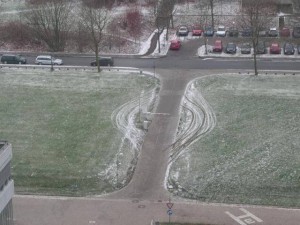Published: 29 November 2009
Backup for http://www.fr33agents.com/1572/the-state-is-a-maginot-line/
Samuel Edward Konkin’s great insight was that smashing the state is not a prerequisite to achieving freedom, but is a consequence of it. The usual political formulation is this:
Choose freedom --> get a lot of people together --> smash the state --> have free markets --> build wealth
Konkin saw that it could instead go like this:
Choose freedom --> have free markets --> get a lot of people together --> build wealth --> smash the state
He saw that the key difficulty is the stages “have free markets” and “build wealth.” The problem with waiting to do that until the state is smashed is that it leaves us no means to actually smash the state. Parties and activists have tried numerous methods to do so: asking the state to smash itself via protesting and voting, violent demonstrations, sabotage, withdrawing from commerce altogether to deprive the state of resources, and hiding one’s resources from the state’s grasp.
A lot of agorist discussion I see focuses on the economics of the state in counter-economics, and looks at the “counter” as merely depriving the state of our resources. While this is an important concept, it fails to get at the heart of what Konkin’s insight really reveals. It still places free markets and wealth building as something to come only after the state is smashed.
What this analysis fails to understand is that without resources, any attempt to smash the state is futile, and that small
 token of progress is
merely a speed bump that can easily be adjusted to. Achieving these
speed-bump victories expends resources and leaves no way to replenish
them aside from going back to work for the state’s institutions,
feeding their accumulation of resources, and saving a meager pittance
to be squandered on the next effort.
token of progress is
merely a speed bump that can easily be adjusted to. Achieving these
speed-bump victories expends resources and leaves no way to replenish
them aside from going back to work for the state’s institutions,
feeding their accumulation of resources, and saving a meager pittance
to be squandered on the next effort.It is widely assumed that free markets and wealth building cannot be done under the states omniscient eye and overarching resources. It is that assumption that Konkin challenged. Its true that the purity of free markets cannot be achieved while the state still exerts its influence. But that does not mean that free markets are unavailable to us entirely, only that they carry risk. Even a little bit of free market activity builds resources. Building resources provides the means to expand those nascent markets. And it provides the means to further act against the state, to deprive it of resources, to bring more and more people into the circle of free markets.
“Counter” economics does not just mean anti- the state’s economics, it also means other than the state’s economics. And while we are building resources to smash the state, we are also building the social and market structures that will prevail once the state is gone.
If we wait to build those structures only after the state is gone, we risk opening the door to opportunists ready and willing to impose their own social and market structures, from the top down. By having those structures already in place, having been tested and honed to be resilient against the most powerful enemy we know, we leave no chaotic and dangerous transition period in which our newly found freedom can be usurped by late-comers.
In fact, with those structures in place, and having grown to the point where they trump the state’s reach and power, there might not even be a need to smash the state. Prior to WWII, the French built their ultimate defensive wall, the Maginot Line, against an anticipated invasion from the Nazi regime. They thought it impenetrable, or at least strong enough that smashing it would come at so high a cost as to make it a Pyrrhic victory.
They were right. But they made an assumption that was fatal to their defenses, and ultimately fatal to tens of thousands of their people. They assumed that the Ardennes forest was equally impenetrable, and left it mostly open as a “natural” defensive obstacle. The German generals, however, knew better. With their modern equipment and knowledge, the forest might as well have been a paved superhighway. The Germans never attacked the Maginot Line, except later, from the rear, as a mopping up operation. They knew that they would have been slaughtered in a frontal assault on it, but also that such an assault was entirely unnecessary.
I suggest we go through the forest.